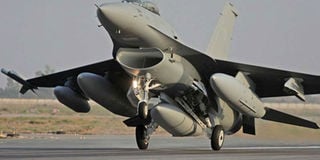Ouko raises red flag on defective military aircraft

One of the fighter jets bought from Jordan. The jets were defective. FILE PHOTO
What you need to know:
- The jets were bought from the Royal Jordanian Air Force through government-to-government negotiations on April 2007.
- Ouko also expressed concern about the direct procurement of supplementary services for the fleet of jets in 2009 for $2.9 million.
Kenya’s military bought seven fighter jets from Jordan that were later found to be defective, and they are now being used as sources of spare parts, the Auditor-General has reported.
Mr Edward Ouko says in his latest report on State’s accounts that the jets were bought from the Royal Jordanian Air Force through government-to-government negotiations on April 2007.
They were part of a fleet for which the government paid $15.3 million (Sh1.5 billion by today’s exchange rates). But when the Ministry of Defence’s technocrats inspected them, the Auditor-General said, they found a number of defects.
SPARE PARTS
When auditors went to Laikipia Air Base on June 2016, they found that the defects were yet to be rectified, and seven jets had not been operational from the time they were brought in Kenya and assembled.
“However, they are being used as sources of spare parts for other similar machines. No justification has been given for the purchase of seven aircraft at $7.1 million (Sh498.2 million), then use them as sources for spare parts,” the auditor said.
He also expressed concern about the direct procurement of supplementary services for the fleet of jets in 2009 for $2.9 million, and a decision to buy spare parts at a cost of $12.9 million through restricted tendering from a company rather than buy them directly from the aircraft manufacturer.
“It was not possible to confirm under the circumstances whether value for money was obtained in the procurement of these spare parts or whether payments were lawful and effective as required under the Constitution,” the Auditor-General said.
EXCAVATORS
Mr Ouko also complained about the military’s failure to explain a decision to buy two excavators at more than four times their market price in the 2011/12 financial year.
The military paid Sh185.3 million instead of Sh40 million for the two excavators.
“No explanation has been given so far for excess and illegal payment of Sh145.3 million over and above the market price,” he said.
At the Foreign Affairs ministry, Mr Ouko found three instances where rent was being paid for houses abroad that were not in use as envoys had been recalled.
This was at the Kenyan embassy in Thailand (Sh8.7 million), South Korea (Sh2.2 million) and Mogadishu (Sh13.7 million).
Despite Kenya’s ambassador to South Sudan having been recalled on June 2013 and paid the required shipment and transfer allowance, the official continued to receive foreign service allowance and had by June 2016 been paid Sh15 million, contrary to the regulations, the Auditor-General said.
LICENCES
The ministry also appears to have bungled a plan to digitise its documents and records in Nairobi.
A contract was awarded and the firm paid Sh32 million of a Sh40-million contract but auditors found that the work was not yet complete and the software licences claimed to have been supplied were not made available to auditors.
In addition, the system failed and training did take place as had been placed.
In Islamabad, Pakistan, the ministry paid a contractor Sh516.7 million for a contract initially worth Sh443.1 million to build the high commissioner’s residence.
The contractor did not finish the job and the contract was terminated.
Neither that nor the payment of more than what had been initially agreed was explained to auditors.
The ministry however got a new contractor, with the job worth Sh90.1 million in 2015, but by March 2017 when auditors went there, the contractor was still on site and had not been levied penalties for failing to stick to the agreed deadline.





